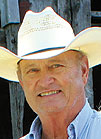
The old adage “raised in a barn” was quite literal for Ellie Melton, who has been milking ever since she can remember.
Her barn daycare served Ellie well, as she became an active member of the Dadeville FFA and recently won the Missouri FFA Dairy Production Placement Award, granting her the honor of competing at the national level.
Now a freshman in college, Ellie, the daughter of Stacy and Susan Melton, began her award-winning project during her freshman year of high school, and continued building on it throughout her four years at Dadeville High School.
“I showed the ownership, or placement, of working on the farm by owning four or five of my Jersey cows that I got through my parents by exchange of labor,” Ellie explained. “Through milking every night and feeding, graining and taking care of the calves, and haying in the summertime, that was my exchange of labor. So, my parents paid for the feed and medicine and anything that was needed for my cows. Each month I calculate and record the average price of milk, grain, hay and medicine, and record how many pounds of milk each cow is producing each milking.”
At the end of the month, Ellie explained, the month’s profits on milk alone depended on how much milk her cows produced and that month’s milk prices. Then grain, hay, medicine, calf and cow sales, and breeding costs were factored into the total.
“This is how I show my profit at the end of each month,” Ellie said. “Overtime, my project shows the profit for the sale of my milk by calculating for just six cows out of our herd of 120. I was very interested in how much money it takes to care for and to own a few cows and I was willing to find the best way possible to make a profit in an efficient and professional way from my sale of milk and baby calves. Some kids who worked on a dairy didn’t do the sale of milk, they just showed the hours they worked on the farm. That’s what was different for mine; I was able to show sale profit for each month.”
Ellie said she was blessed to be a part of Dadeville FFA, as the chapter gave her not only golden opportunities through convention trips to Washington D.C., Louisville, Ky., and Indianapolis, Ind., but many friendships as well.
Ellie contributed her passion and success in FFA to her advisor, Jordan Buck.
“He helped me achieve my goals such as serving as chapter president my senior year, earning my State Farmer Degree, and helped me win at state.”
Ellie works at SoMo Farm and Ranch, where she holds a part-time retail position. Running tickets for feed and animal health products has provided additional knowledge for Ellie to apply on the dairy farm at home. She learned about chemicals for spraying, protein percentages of grains, and pros and cons of health products for not only cattle, but horses, pigs, goats and sheep as well. However, Ellie said she’ll stick with her Jerseys for now.
Dairy cattle are a full-time job, especially because the Melton family has never had any hired hands on their farm, located on the outskirts of Dadeville, Mo. Thus, Ellie and her sisters, Abby and Annie, share the chore load.
The Melton’s farm, Twin Springs Jerseys, runs 120 Jersey cows, which require milking twice a day. The cows are brought into the barn at 5 a.m. and 3:30 p.m. to be milked 10 at a time by machine. Even with up to 40 cows dry for calving, milking the whole herd takes about two hours each time.
The Meltons sell their milk through Central Equity Milk Co-op, which goes to Seneca, Mo. Cleanliness and comfort is crucial, according to Ellie, so the milkers, pipes and tanks are purified before the cows enter the barn. Once the equipment is set up, the cows’ teats are sterilized before and after milking.
The Jerseys are fed while being milked, with a feeding system that lets down grain every 12 to 15 seconds. In addition, the cattle are rotated through pastures to graze during the day, and fed alfalfa in the evenings for higher protein.
The Melton family grows all their alfalfa, versus paying to have it trucked in from out of state. When weather permits, four to five cuttings of alfalfa keep the Meltons hopping in the summer.
Ellie said hauling and raking hay are her favorite jobs, but tending to the bottle calves rivals the hayfield.
Using artificial insemination, Twin Springs Jerseys produces both fall and spring calves. Upon birth, calves are kept separate for about a week to be introduced to the bottle, then join a group other bottle-feed calves.
While dairy is their main business, the Meltons receive additional income through their 70 head of Black and Red Angus.
Working together on the farm has pulled the family together, Ellie said, although “There’s always people at my job that will joke about how Dad probably wishes he had some boys around, but us girls have always really loved it; even since we’re in college and we still like to do it, goes to show how much we really love it.”
Ellie is living at home in order to help run the farm while taking classes at Ozarks Technical College, with plans to further her education at Missouri State University, possibly pursing degrees in agribusiness or dairy science. This way, Ellie will be prepared to make reality of her dream of running Twin Springs Jerseys someday.
Melton Farms is and has always been a family operation, and Ellie would like to keep it that way. She contributes her love of dairy farming to her family.
“My grandpa and my dad actually started it. So it’s really always been in my family; my grandpa taught my dad, who taught us girls, so hopefully we can teach our kids someday.”







